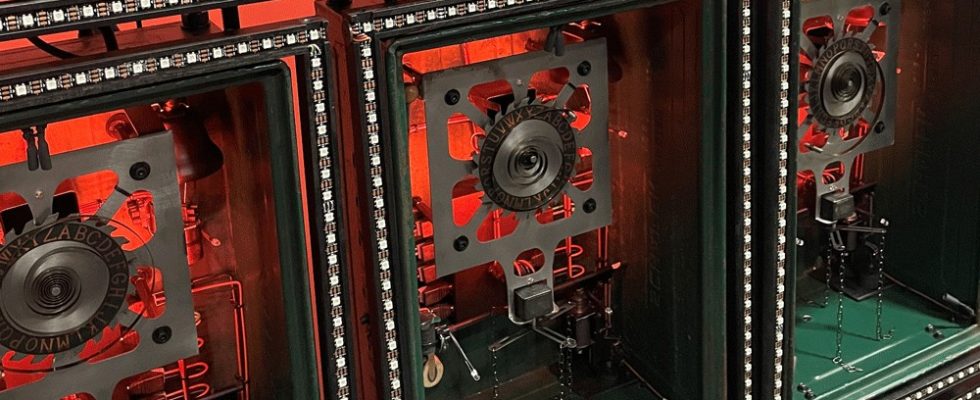If you ask the bot “Chat-GPT” whether it knows Christopher, the artificial intelligence answers: “No, I don’t know Christopher.” The chatbot should actually be familiar with its distant relative from the 1940s. Although “Christopher” still generated his answers using a random generator at the time, his invention laid the foundation for artificial intelligence. Its creator is now known as the founder of modern computer science. And also for the fact that he made a significant contribution to the end of the Second World War using technology.
On the stage in Hall 50 of the Domagkateliers, Thorsten Krohn plays the scientist Alan Turing as a nervous, withdrawn guy, in front of the backdrop of a powerful machine. “Who Alan Turing really was remains in the dark,” says the director of the installation theater project “Alan – Mensch Machine” at the Spagat cultural stage. However, what we know about Turing is as fascinating as it is shocking.
The Brit, born in 1912, discovered his passion for advanced modern science while still at school – and that he was attracted to a classmate named Christopher. When his childhood sweetheart suddenly died of tuberculosis, Turing’s fascination with the problem of the mind and brain flourished.
During the Second World War he developed a new machine at Bletchley Park that was capable of cracking the military signals of the Germans’ Enigma machine. But there was no great praise – his work was swept under the carpet until after the end of the war. Because homosexual activity of all kinds was illegal in his time, Turing was later prosecuted and given a fateful choice: either go to prison or undergo chemical castration as part of his probation. He chose his “freedom” and developed depression as a result of his treatment. He then took his own life.
A plea for quiet
It was Turing’s loneliness that Thorsten Krohn was able to connect with. “A quiet, calm person,” is how he describes the genius. The play is a plea for quiet, he says. The production of Alan Turing’s tragedy is anything but quiet. The powerful machine comes into action with a lot of rumble, noise and rumbling. When Christian Taison Heiß, who directs together with Krohn, presses the buttons on the technology desk, an impressive show begins.
The Portmanteau duo, consisting of sound engineer Heiß and mechanic and electronics engineer Greulix Schrank, worked on the music machine for over a year. The music duo upcycled 20 shepherd sorting boxes into an installation machine that can depict a variety of sound worlds with complex rhythmic sequences. From clapper strikes to bell ringing to chain scraping. “We wanted a machine that could combine the three major trades of sound, sound and light,” explains Heiß. And by the way, she also “plays” the Turing machine Christopher. Couldn’t stimulating technology easily replace the people on stage? “The machine is pure luck. But ultimately it is a piece about a person,” says Krohn.
“Alan – Man Machine”Thurs., Nov. 30th, Sat., Dec. 2nd, Thurs., Dec. 7th, Fri., Dec. 8th, Sat., Dec. 9th, Hall 50, Domagkateliers Munich, Margarete-Schütte -Lihotzky Street 30

